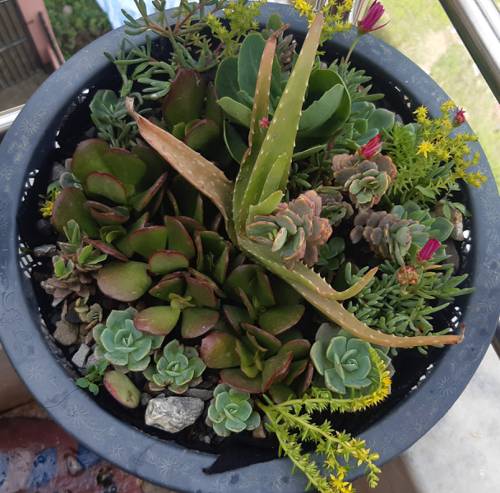
FAQ About Indoor Plant Sensory Stimulation Benefits

What are the sensory benefits of indoor plants?
Indoor plants offer sensory benefits such as visual appeal, which can reduce stress and increase feelings of well-being. The textures of leaves and flowers provide a tactile experience, and the natural scents of plants like herbs can enhance mood and cognitive function. These sensory interactions help engage the senses, which in turn can enhance comfort and creativity.

How do indoor plants enhance mental well-being?
Indoor plants contribute to mental well-being by improving mood, reducing stress, and promoting relaxation. Spending time with plants can lower cortisol levels and blood pressure, leading to a calmer state. Additionally, caring for plants can give a sense of purpose and achievement, boosting self-esteem and satisfaction.

Can indoor plants improve air quality?
Yes, indoor plants can improve air quality by photosynthesis, where they absorb carbon dioxide and release oxygen. Some plants can also filter pollutants from the air, such as benzene, formaldehyde, and trichloroethylene, contributing to a healthier indoor environment.

What types of indoor plants are beneficial for sensory stimulation?
Beneficial indoor plants for sensory stimulation include lavender and jasmine for their calming scents. Orchids and succulents offer unique textures, while visually striking plants like snake plants and fiddle leaf figs enhance visual stimulation with their distinct shapes and patterns.

How do indoor plants reduce stress?
Interactions with indoor plants can reduce stress by providing a calming effect and lowering physiological stress markers like heart rate and blood pressure. The act of caring for plants requires mindfulness, which can serve as a form of meditation, reducing stress levels.

Are there therapeutic benefits associated with indoor gardening?
Yes, indoor gardening offers therapeutic benefits by promoting physical activity, providing a sense of accomplishment, and encouraging relaxation. The act of nurturing plants can foster a connection with nature and help reduce anxiety and depression symptoms.

What are some common misconceptions about indoor plants and sensory benefits?
A common misconception is that all plants enhance air quality significantly; while they do contribute, the effects might not be as impactful as mechanical air purifiers. Moreover, some believe that plants require very high maintenance, but many plants are low-maintenance and still offer sensory benefits.

Can indoor plants help improve concentration and productivity?
Studies have shown that indoor plants can enhance concentration and productivity by reducing mental fatigue, improving mood, and purifying the air. The presence of plants in workspaces has been linked to heightened focus and increased productivity.

How does the scent of indoor plants affect mental health?
Aromas from plants such as lavender, mint, and rosemary can have positive effects on mental health. These scents are known to induce relaxation, improve cognitive function, and reduce anxiety, making them a valuable addition to home and office environments for mental well-being.

What role do indoor plants play in mindfulness practices?
Indoor plants play a significant role in mindfulness practices by encouraging a focus on the present moment. The physical act of planting, watering, or simply observing plants can serve as a meditative practice, helping to calm the mind and reduce the stress of daily life.

How can indoor plants promote creativity?
By creating a stimulating and visually appealing environment, indoor plants can spark creative thinking and provide inspiration. The diversity in color, texture, and shape encourages an imaginative mindset, which can be particularly beneficial in artistic or design-focused settings.

Do all indoor plants provide sensory stimulation?
Not all indoor plants provide significant sensory stimulation, as it depends on their physical characteristics. Plants with aromatic flowers, visually striking foliage, or interesting textures are more likely to engage the senses compared to plain foliage plants.

Can caring for indoor plants offer long-term mental health benefits?
Yes, the long-term care of indoor plants can offer mental health benefits by fostering a sense of responsibility, providing routine, and rewarding achievements through successful plant care. Consistent interaction with plants can help cultivate patience and improve mood over time.

How do indoor plants contribute to a sense of well-being?
Indoor plants contribute to a sense of well-being by creating a calming atmosphere, enhancing air quality, and offering pleasing aesthetics. Their presence can make a space feel more inviting and can positively influence mood and stress levels.

Are there specific indoor plants that are more effective for reducing anxiety?
Plants like lavender, chamomile, and peace lily are particularly noted for their anxiety-reducing properties due to their calming scents and the soothing effects of their greenery. These plants can serve both decorative and therapeutic purposes, aiding in relaxation.

How does the presence of indoor plants impact sleep quality?
Indoor plants like lavender and jasmine can improve sleep quality due to their natural calming scents which promote relaxation and reduce stress before bedtime. The presence of these plants in the bedroom can create a more restful environment and enhance overall sleep quality.

What is the psychological impact of interacting with indoor plants?
Interacting with indoor plants can have a positive psychological impact by reducing feelings of anger, fear, and depression. The nurturing process can enhance happiness and satisfaction, while the visual presence of plants can evoke a sense of peace and connectedness to nature.

Do indoor plants require a lot of maintenance for sensory benefits?
While some indoor plants require regular maintenance, many low-maintenance varieties still offer sensory benefits. Peace lilies, snake plants, and succulents are examples of low-maintenance plants that provide aesthetic, air quality, and sensory advantages without extensive care.

Can having indoor plants reduce symptoms of depression?
Yes, having indoor plants can reduce symptoms of depression by providing a sense of purpose, responsibility, and joy. Interacting with plants can lead to increased physical activity and offer a calming, nature-connected experience which combats depressive symptoms.

How can the aesthetic appeal of indoor plants impact mental health?
The aesthetic appeal of indoor plants can impact mental health by elevating mood, reducing stress, and creating a more pleasant environment. The natural beauty of plants can inspire positive feelings and enhance the overall atmosphere of a living or working space.
